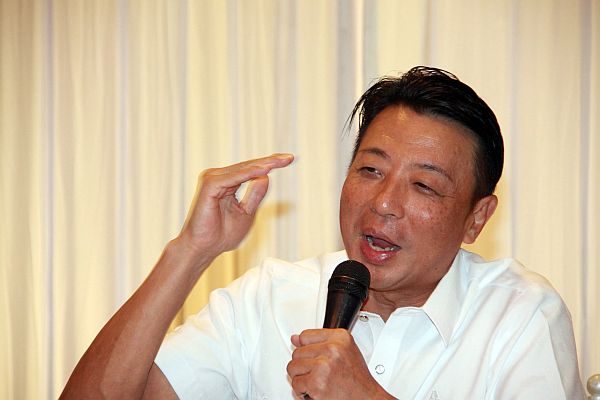
Takashi Sumi, Atlas Fertilizer Corp. president and CEO, discusses updates on the agriculture sector and on the events to celebrate AFC’s 60th anniversary during a press briefing in Cebu City.
Fertilizer firm’s top exec calls on gov’t to move to uplift agriculture sector
The government should subsidize farming inputs so as to achieve food security and uplift the country’s agriculture industry.
Takashi Sumi, president and chief executive officer of Atlas Fertilizer Corp. (AFC), made this call especially since the Philippines is the only country in Asia where fertilizer and other farming inputs are not subsidized by the government.
“Indonesia, India and Thailand – they put more budget for food security. The Philippines is not like that yet,” Sumi said in a press briefing for 60th anniversary of AFC, one of the country’s largest fertilizer companies, at the Waterfront Cebu City Hotel & Casino on Tuesday.
AFC
AFC, originally a subsidiary of Atlas Mining Corporation (now Carmen Copper Corporation), was founded on October 10, 1957.
In the last 60 years, the company has been producing and distributing fertilizer products from its plant in Toledo City. It has also been disseminating different farming technologies to farmers over the last six decades.
Sumi said the government needs to realize the importance of subsidizing farmers, whether through fertilizers, hybrid seeds or any form of insurance, if it wants to see 100 percent food security.
Initiative
He said they have taken the initiative to frequently talk with the Department of Agriculture (DA) on what Filipino farmers need to improve their yield including irrigation, mechanization, financial support and provision of seeds.
“If we want the whole industry to rise and bring farmers out of poverty, we need to provide not only fertilizers, but the whole system, which includes farm-to-market roads, among others,” said Sumi.
While these suggestions have yet to be implemented, Sumi said the government had already taken a step into the direction of helping farmers increase their yield through the provision of free irrigation.
Sumi said the Philippine agriculture sector still has much room to grow, with rice harvest, among others, quite smaller in volume compared to other Asian nations.
Vietnam, which learned rice technology from the Philippines, harvests twice more while China harvests four more times than the Philippines.
Helping farmers
The executive stressed the importance of helping local farmers increase their yield, especially since the Philippines is at a disadvantage being prone to natural disasters.
“Filipino farmers cannot input so much for better harvest. That is why we are teaching them farming technology which allows them to use less input and get bigger yield,” said Sumi.
AFC manufactures 300,000 metric tons as well as imports and distributes around 150,000 metric tons of fertilizer annually, commanding about one-fourth of the whole fertilizer industry.
Citing third party data, Sumi said that while agriculture does not contribute so much to the country’s gross domestic product (GDP), it has been growing one to 1.5 percent annually in recent years.
Agriculture accounts for almost 10 percent of the country’s GDP.
Transitioning
While the Philippines is considered an agricultural country, it is already transitioning from an economy based on agriculture into one that is more focused on services and manufacturing.
Sumi added that AFC’s production has increased by 50,000 metric tons over the last two to three years, an indication of the growth of the Philippine economy.
He said they intend to capitalize on the market growth should it continue in the next 10 to 20 years through its running operational plan.
Part of this is the rehabilitation of their Toledo facility, projected to cost more than P1 billion and will take about three to four years to complete.
Sumi said they expect to increase their production capacity by 20 to 40 percent upon completion of the project.
Migration
In recent reports, the Food and Agriculture Organization (FAO) of the United Nations also urged the national government to invest more in rural areas to keep Filipino farmers from migrating to other countries.
Migration is among the pressing issues faced today by the Philippine farming sector, particularly in areas where conflict and poverty are present, FAO representative in the Philippines José Luis Fernández said.
He said investing in rural development and food security has been at the core of the partnership between the FAO and the DA.
Among these investments are increasing farm production and productivity, restoring livelihoods after disasters, building resilience, equipping people with skills to pursue off-farm livelihoods and increasing their business skills as well as establishing linkages with markets.
Disclaimer: The comments uploaded on this site do not necessarily represent or reflect the views of management and owner of Cebudailynews. We reserve the right to exclude comments that we deem to be inconsistent with our editorial standards.




